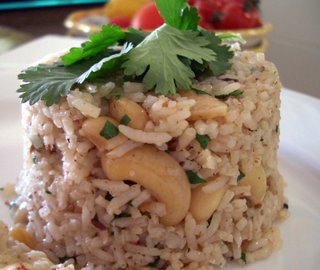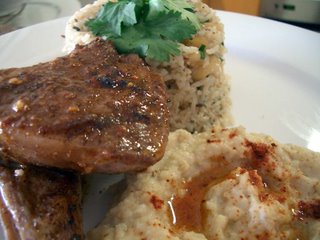Nutty rice pilaf
 A while back Neil from Food for Thought was chewing through the gritty question of whether to wash or not wash rice. He seemed to be a ‘not wash’ kind of guy – rice wise I mean – and there were many comments about rice type-specific washing trends around the globe. Food bloggers are nothing if not cutting edge, tackling the tough issues of domestic cookery.
A while back Neil from Food for Thought was chewing through the gritty question of whether to wash or not wash rice. He seemed to be a ‘not wash’ kind of guy – rice wise I mean – and there were many comments about rice type-specific washing trends around the globe. Food bloggers are nothing if not cutting edge, tackling the tough issues of domestic cookery.I offered the comment that I don’t wash basmati rice (or indeed those other varieties that are suitable for risotto or paella) but do for sushi or jasmine rice. I had neglected to ponder the pilaf. Having recently made a biryani, it brought back to me the need to sometimes wash the noble basmati grain, to achieve that really well-cooked-yet-separate sliver, so sought after in the cuisines of the subcontinent.
Flicking through SFI (Super Food Ideas) like the total cooking mag slut I am, I came across a recipe by Adrian Richardson. While he's not owning and running La Luna in Carlton, Melbourne, he endures the tortures of Ready, Steady, Cook which, if it were around in Dante’s time, would surely be configured as a circle of hell. I’ve changed the recipe a bit to suit what I was whipping up at the time and to include one of my favourite spices, cardamom, so this is what I’ve come up with. And the rice is, yes, washed.

2 teaspoons cumin seeds
1 teaspoon of coriander seeds
1 teaspoon cardamom seeds
¼ tsp ground cinnamon
2 cloves of garlic, crushed
1 ¼ cups basmati rice, soaked for 15 minutes then rinsed til the water runs clear
½ cup mixed cashews and pine nuts (see picture left)
2 tbsp peanut oil
500 mls chicken stock
½ cup of chopped coriander leaves.
 Stir for a few minutes until aromatic then add the nuts. Stir ‘til the nuts are slightly golden then add the rice, stirring to coat with the oil and spice mixture for a few minutes. Add the chicken stock and bring to a simmer. Cover and simmer 10-12 minutes then remove the lid, fluff the rice with a fork, replace the lid and let stand 5 minutes. Stir through the coriander and serve.
Stir for a few minutes until aromatic then add the nuts. Stir ‘til the nuts are slightly golden then add the rice, stirring to coat with the oil and spice mixture for a few minutes. Add the chicken stock and bring to a simmer. Cover and simmer 10-12 minutes then remove the lid, fluff the rice with a fork, replace the lid and let stand 5 minutes. Stir through the coriander and serve.





4 Comments:
Ahh washed yes, but is it soaked? I need to know this stuff. Life was so simple once.
Yep - soaked for 15 mins for this recipe and biriyani suggested 20-25. Just to add to all the complexities we have to deal with :)
Sometimes washing is a health issue, not just about getting rid of loose starch. Australian rice is produced and processed to high quality standards, so washing is ony needed for culinary reasons (or preference). Imported rices (depending on country of origin and quality) may be contaminated with polishing compunds and other bits and pieces nof generally considered desirable.
Wow - that's interesting. I hadn't thought of that, but you're right. SOmetimes we don't know how lucky we are!
Post a Comment
<< Home